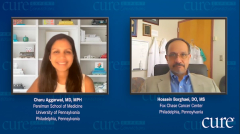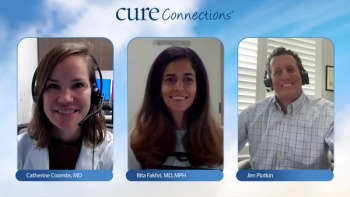
Immunotherapy for Patients With NSCLC
Considerations for treating patients with non-small cell lung cancer with single-agent immunotherapy vs chemoimmunotherapy.
Episodes in this series

Hossein Borghaei, DO, MS: We talked about the PD-L1 testing and all of that, and we have to move on to the conversation regarding immunotherapy at this point. How do you think immunotherapy has changed what we do in lung cancer? How has it impacted the treatment? Where do you see us going now?
Charu Aggarwal, M.D., MPH: It’s had a huge impact. You mentioned that we now have 5-year survival outcomes for patients who were treated with immunotherapy, and we’re seeing a significant increase in survival. Just to give you an example, I still have many patients who were initially enrolled on the phase 1 clinical trials of immunotherapy using drugs targeting both the PD-1 and PD-L1 pathways. These were patients who were enrolled with metastatic disease in 2012 and 2013. Some of them even enrolled in 2011. We’re talking about personal anecdotes of patients with brain metastases or with stage IV disease who are now alive eight to 10 years out. We see this. We have long-term survivors.
The treatment landscape of lung cancer has completely changed, and I often think about it as, how can we avoid giving chemotherapy in the clinic? We have the ability to deliver targeted therapy, but we also now have the ability to save chemotherapy as a later-line approach. There are patients where we can come in with monotherapy. You have led some of the trials with dual checkpoint blockade and how we can come in with two immunotherapies instead of one. The advances have only led to improvements in survival. This is more true in a way for patients who have high PD-L1 expression, more than 50%. What percentage of those patients are in your setting? How do you standardly approach them?
Hossein Borghaei, DO, MS: Great question. This comes up all the time. Based on all the data I’ve seen, I’d like to think that the PD-L1 level of expression is a third, a third, and a third. To simplify, a third of patients have PD-L1 over 50%, which at this point, we’re technically defining as high PD-L1. Another third are in the 1%-49% range, and then there are a third of patients who basically have tumors that are PD-L1–negative. The way I approach this is that if I see somebody with a high PD-L1—higher than 50% or better is the preference—I’d like to evaluate and see if a single-agent checkpoint inhibitor can be used in that setting, and as you pointed out, save the chemotherapy for future lines of therapy if needed.
The way I can figure out how I want to approach this is by assessing a patient’s symptoms. Unfortunately, we see patients with advanced disease who are very symptomatic with a huge disease burden, weight loss, night sweats, cough, and issues that indicate that the disease is in need of rapid control. For patients like that, regardless of the level of PD-L1 expression, the combination of chemotherapy plus immunotherapy can be very effective in getting you a quicker response because we still get a cytotoxic response from the standard chemotherapy, which is added to by having an immunotherapy added.
On the other hand, if I see someone with advanced disease without significant symptoms and high PD-L1 expression, it’s very appropriate to have a discussion regarding single-agent checkpoint inhibitors. In my view, it’s not wrong to offer chemoimmunotherapy to everyone who comes to the clinic. But if you’re thinking about personalizing the delivery of care and minimizing some of the side effects, then it’s a good idea to do those kinds of assessments and figure out who would be a good candidate for single-agent checkpoint inhibitor versus someone who we know could need a combination of chemotherapy and immunotherapy.
Transcript edited for clarity.

